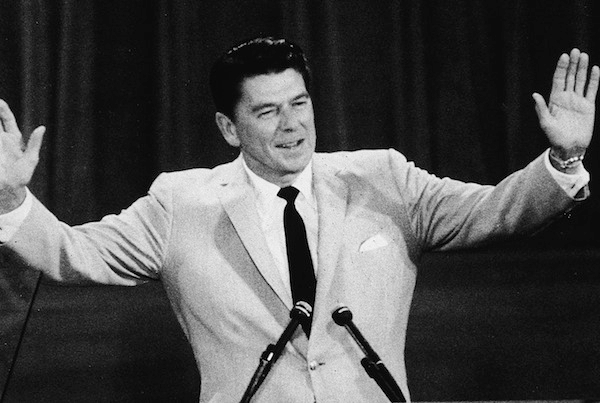Ed Miliband has taken inspiration for his 2015 attack line from an unlikely source: Ronald Reagan. In 1980, a week before the election between himself and incumbent President Jimmy Carter, Reagan told voters to ask themselves: ‘Are you better off than you were four years ago?’
At PMQs today, Ed Miliband told the Prime Minister ‘In 2015, people will be asking “Am I better off now than I was five years ago?”’ His hope, clearly, is that voters will decide the answer is ‘no’ — and that they’ll vote against the government as a result.
Miliband’s hopes are pinned on Office for Budget Responsibility forecasts, according to which average earnings will be lower, in real terms, at the next election than they were at the last, as this graph shows:

But even if that prediction does come to pass, Ed would be mistaken to think that he’ll be in Reagan’s position to Cameron’s Carter.
For one thing, Americans were better off in 1980 than they’d been in 1976: real income per capita was 7 per cent higher, and the number of people in work had risen by more than 10 million. If they’d really asked themselves the question Reagan told them to, they might well have re-elected Jimmy Carter. Instead, what Reagan correctly hoped voters would be asking, as Nate Silver put it in September, was ‘What have you done for me lately?’ Rather than looking at the past four years, they were focusing on the recent recession, during which employment dropped by 1.2 million. From 1979 to 1980, average incomes fell by 2.2 per cent.

Given voters seem to focus more on the last year than on the government’s whole term, those OBR figures might actually give Cameron (mild) cheer: they show real average earnings rising by 1.7 per cent in the last year of this Parliament when adjusted for CPI inflation, or by 0.6 per cent by RPI inflation.
And, of course, real earnings are only one aspect of whether people think themselves ‘better off’. On another — employment — Miliband’s attack is unlikely to work very well. There are already 700,000 more people in work than there were at the last election — a figure the OBR expects to rise to about 1 million by 2015. And while it does forecast a slightly higher unemployment rate in 2015 Q2 (8.0 per cent) than in 2010 Q2 (7.9 per cent), that would still represent a fall of 0.3 points from the 8.3 per cent rate it forecasts for 2014 Q2.

Of course, all of this is based on forecasts that could turn out to be too optimistic or too pessimistic. But Miliband shouldn’t be confident that they point to a favourable election for him come 2015.






Comments